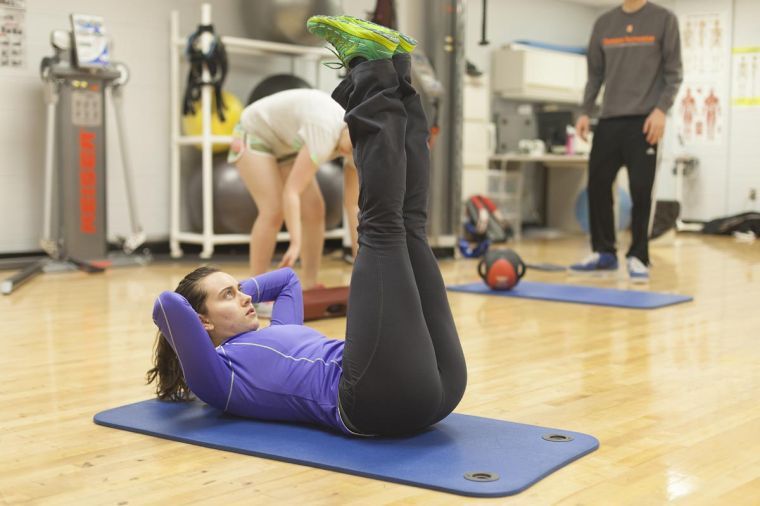How to stay healthy over the holidays
December 12, 2013
It can be difficult to find the motivation to eat healthy and stay active during winter. The eggnog and pies are calling, and mom’s cooking does not help either. However, it is important to maintain a healthy body even when all we want to do is pig out on holiday treats and watch Netflix.
Erica Nehrling Meador, assistant director and dietician of dining services, explained how people can fall into the trap of eating more than necessary during this time of the year. She said that people are usually all-or-nothing thinkers, either overloading on one food item or taking huge servings instead of pacing themselves.
Nehrling Meador also stated people often mindlessly eat during the holidays and do not take into consideration what or how much food they are putting into their bodies. She also explained people can fall into the trap of eating simply because they see others eating.
To avoid taking in more calories than necessary, Nehrling Meador suggested students stick to smaller portions.
“Students can start with bigger servings of vegetables and meat and smaller servings of starches,” Nehrling Meador said.
Get The Daily Illini in your inbox!
When it comes to beverages, water and skim milk can counteract high-calorie foods, she said. She also said alcohol around the holidays cause people to lose their inhibitions, resulting in students not caring about what food they consume.
“It helps to go middle of the road. It’s hard to say, ‘One day I ate unhealthy, (the) next, perfect,’” Nehrling Meador said.
Nehrling Meador said she doesn’t necessarily disapprove of snacking during the holidays.
“Try veggies and water or a low-calorie beverage prior to a meal,” she said.
The University Housing chefs are trained to decrease salt and fat content while still making the food flavorful. For example, the Dec. 10 menu at Illinois Street Residence Hall had salmon and roasted vegetables, cream of potato soup and assorted cheesecakes for dessert. Nehrling Meador stressed that while healthy options are available, comfort foods are also necessary.
“It’s so easy to gain weight. We hit Thanksgiving and don’t get back on track until Jan. 1. People make all-or-nothing New Year’s Eve resolutions where they give up everything,” she said. “Try to do 50 percent; do better 50 percent of the time in stepping towards being healthier.”
University Housing Dining Services has also tried to remedy excess food intake. One of the benefits of the University’s decision to eliminate dining hall trays in 2008 is that it decreases the amount of food a student puts on his or her plate, as well as decreases the amount of uneaten food thrown away, Nehrling Meador said.
Besides eating healthy, students also should continue their workout regimes during the winter.
Kenneth Wilund, associate professor in kinesiology, and Caroline Smrokowski, Campus Recreation personal trainer and program assistant for personal training, both stressed the importance of staying active during the winter.
“Most people over break tend to lose a lot of what they were working on. They get less active. It’s a lot easier to maintain weight than to lose. It’s harder after having time off,” Wilund said.
Smrokowski explained the inclement weather often decreases students’ motivation to work out throughout the winter.
“In winter, people stay in, versus over the summer, they’ll go out and do different activities. It can be harder to work out, but it can be very beneficial for your health,” she said.
Smrokowski recommended students utilize the resources offered by Campus Recreation, including circuit training. Students can choose a few exercises, such as squats or dips with a certain amount of repetitions during each exercise. Using stairs is another convenient way to exercise. At Campus Recreation, other activities include cycling, using kennel bells or participating in suspension training, where a student can hold onto a rope and pull himself or herself up.
Students still can work out even if they can’t leave their apartments. They can do pushups and burpees in the convenience of their living spaces. A burpee is when a person is in standing position, jumps down into a pushup, does the pushup, and jumps back up into a standing position.
When it comes to working out during the winter, it is not uncommon for people to rely on their New Year’s resolutions.
“If you can try it out prior to New Year’s Day, it’s better to see if it will actually work. If you can’t do it in December, you won’t do it in January,” Wilund said.
Wilund said good motivational tools include keeping records of food intake and having achievable goals. He also warned against not working out all parts of the body.
“People need a well-balanced program, a mix of cardio and muscular strength,” Wilund said.
“Don’t just stick with one exercise. You won’t get bored. You should always challenge yourself and constantly be changing it up. Build up intensity and don’t let your body plateau,”
Smrokowski added.
Mara can be reached at [email protected].







